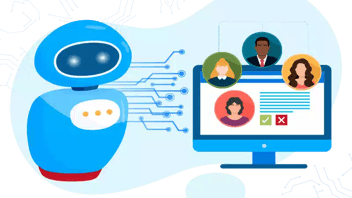How AI and Recruitment Marketing Tools Can Simplify Hiring Processes
At the moment, in a demanding job market, firms are making every effort to design and use innovative methods such as and more to hire, retain, and attract the best quality employees. Traditional recruitment methods are not only inefficient and ineffective but also insufficient and adequate to respond to the current demands of the recruitment process and thus result in an expensive, inefficient, slow, and cumbersome process.
Then artificial intelligence (AI) and recruitment marketing software revolutionizing pair are on the horizon to reinvent hiring procedures, enhance candidate experiences, and enhance general recruitment results. This article will explore how these technologies can simplify hiring and why they are indispensable for modern recruiters.
1. Automating Candidate Sourcing
Candidate sourcing may be the most labor-intensive part of the recruitment process. Many days could be wasted manually looking for the correct one amongst resumes, job boards, or LinkedIn. This could be done by AI technology scanning the readings of millions of profiles automatically and retrieving matching candidates for designated job postings.
For example, an artificial intelligence (AI) algorithm can use Natural Language Processing (NLP) to scan the text for a job posting to identify job seekers with relevant resumes. Technologies that can perform both can also, in addition to considering candidates by their skills and experience, be a tool for assessing candidates in the context of the job requirements and, as such, reduce time spent on the initial screening of candidates.
Key Benefits:
- Saves recruiters hours of manual work.
- Increases the quality of sourced candidates.
- Enhances diversity by minimizing unconscious bias in candidate selection.
2. Enhancing Candidate Engagement
It is paramount to maintain a candidate's interest at every stage of the hiring process and provide them with sufficient good reasons for learning, using, and attitude toward the skill. Recruitment marketing applications that use Artificial Intelligence (AI) can develop personalized communication and support activity after treatment, which can be implemented to ensure and maintain candidate engagement.
For example, chatbots can deliver real-time answers to frequently asked questions, give feedback about the application state, or even book an interview. These AI-enabled dialogues are always available, always on, and provide job seekers with fast answers and affirmation.
Key Benefits:
- Improves candidate experience.
- Reduces dropout rates during the hiring process.
- Frees up recruiters to focus on high-value tasks.
3. Optimizing Job Advertisements
Writing powerful job ads to attract the perfect candidate is an art and a science. Recruitment marketing tools use AI to infer the effectiveness of job postings and deliver data-related optimization recommendations.
AI can also be applied to component grading, such as determining the sentence structure of job titles, the elements that should be present, and the length of job descriptions to ensure the best visibility and engagement. These devices also contain features that forecast the kind of platforms (e.g., LinkedIn, Indeed) that would yield the highest-quality pool of candidates for the corresponding job.
Key Benefits:
- Increases the reach and effectiveness of job ads.
- Reduces time-to-hire by attracting better-fit candidates faster.
- Provides actionable insights for future job postings.
4. Streamlining Resume Screening
AI can also automate tedious workflows that it can substantially enhance, such as resume screening. With the help of powerful AI systems, it is possible to screen thousands of employment resumés within minutes by directly matching the candidate's criteria, competencies, and experience to their needs.
Integrating these systems with resume builder applications allows candidates to construct resumes optimized for particular job postings. This simplifies the screening process by guaranteeing recruiters receive high-quality, uniform applications.
Key Benefits:
- Drastically reduces time spent on resume reviews.
- Ensures a fair and unbiased screening process.
- Improves the overall quality of shortlisted candidates.
5. Improving Interview Processes
AI could be implemented rapidly and significantly impact designing a more efficient and effective interview process. Video interview systems based on AI can detect candidates' speech, voice, and physical postures to determine their qualifications for the job.
This allows the interview process to be automated using AI-based tools, which recruitment professionals and job seekers use. Interviewable interactivity, i.e., the foundation of interview scheduling, becomes somewhat irrelevant.
Key Benefits:
- Saves time and reduces scheduling conflicts.
- Provides data-driven insights into candidate performance.
- Enhances the overall efficiency of the interview process.
6. Leveraging Predictive Analytics
Predictive analytics supported by AI is transforming recruitment through its ability to forecast hiring success. These tools use a history of data to forecast performance metrics such as candidate success rates, time to fill or terminate, and attrition risk.
This information allows the recruiter to make the correct, smart, strategic recruiting decision, rank applicants, and accelerate the recruiting process. For example, predictive analytics in and out of the workplace evaluate historical work success to identify candidates who will succeed most in certain work.
Key Benefits:
- Enables data-driven decision-making.
- Improves the accuracy of hiring predictions.
- Reduces the risk of bad hires.
7. Enhancing Employer Branding
A good employer brand is crucial for recruiting top people. The recruitment marketing toolkit allows companies to create and maintain a strong employer brand using strategic activities relating to employee endorsement and fun content.
AI may use social media trends, review posting on websites such as Glassdoor, and other feedback streams to identify areas where the system needs to be modified. In addition, this is also useful to companies to project a genuine, appealing image to recruits.
Key Benefits:
- Attracts high-quality candidates.
- Boosts team member retention.
- Strengthens the company's reputation in the job market.
8. Reducing Hiring Bias
Implicit bias in recruitment is one of the most significant problems from which it is possible to prevent diversity and inclusion, including, but not limited to, AI-based recruitment systems. AI-based recruitment systems can bypass it using a pure objective-based (e.g., skills, experience, qualification) criterion.
On the one hand, anonymizing applicant data (i.e., removing sensitive data like name, sex, and age) through blind resume screening ensures a fair and unbiased selection process.
Key Benefits:
- Promotes diversity and inclusion.
- Creates a more equitable hiring process.
- Builds trust among candidates.
9. Providing Real-Time Analytics
Tools for recruitment marketing are available, featuring strong analytics dashboards that provide actionable metrics on hiring, etc. These are a few methods for recording values on simple performance metrics, such as application volume, cost-per-hire, and candidate involvement rate.
Using the concepts above, recruitment practitioners can detect roadblocks, process bottlenecks, and efficiency measures of all possible approaches. AI also delivers predictive, answerable, and actionable information and advice for optimization.
Key Benefits:
- Offers a clear view of recruitment performance.
- Enables continuous optimization.
- Supports data-driven decision-making.
10. Facilitating Onboarding
The hiring process doesn't end with an offer letter. Effective onboarding is an essential part of any framework that is likely to result in success for new team members. The AI-based, on-board training facilities automate the document extraction process, assignment assignment generation, and scheduler generation.
However, these applications can be customized to provide individualized employee onboarding for the position, workplace, and choice. As a result, it becomes feasible to acclimate the new hire to the company smoothly.
Key Benefits:
- Reduces administrative workload.
- Enhances new hire satisfaction.
- Accelerates time-to-productivity.
11. AI-Powered Screening Reduces Bias and Enhances Diversity
The most problematic of all recruitment issues is how the recruitment process can be modified to minimize bias. Traditional recruitment procedures, as such, are, of course, also contaminated with unconscious discrimination, such as gender, age, race, and nation of origin/residence/stay. Using the benefits of AI technologies and recruitment marketing methods is not only desirable but also achievable to prevent the rise of such biases, as well as to prevent the increase of such biases by systematic, critical review regarding only the required qualifications/work expertise.
Such AI screening devices can automatically scan the body text of resumes and CVs to narrow the field of potential candidates to the top contenders for initial acquisition. This enhances the pool of candidates and has the strong potential to introduce fairer and more representative recruitment practices in corporations.
12. Improved Candidate Engagement with Chatbots
Candidate engagement is crucial in building a high-quality talent pool, but members' exploratory and contingent responses to candidates are cumbersome and unreliable. AI-powered chatbots can significantly improve this communication.
These agents can be instructed to turn in reminders at a particular time, respond to routine queries about the recruitment pipeline, and assist entrants in booking interviews. Chatbots provide a tailored, responsive candidate experience and help reduce the amount of time recruiters have to spend on a task that will be scalable.
13. AI-Based Job Matching for More Accurate Results
For this reason, job-matching AI-based algorithms are not limited to understanding the job posting. Still, they can also understand the job applicant's resume and select the best-fit candidate for that job. Variants of these systems include a deep range of items, such as abilities, experience, cultural fit, and even psychological traits.
In contrast to the classical keyword match model, AI considers the case of a candidate that is observed, the business expectation, and the enterprise context. Due to this, the platform suggests more detailed job suggestions that decrease the recruiter's time spent searching for inappropriate job candidates.
14. Automation of Scheduling and Interviewing
The interview process is the most arduous stage of recruitment. AI-supported recruitment tools can automate this task by facilitating engagement on both sides of the funnel--the candidate side and the recruiter side--and the automation of screening activity. Once a prospective candidate is screened, these tools may automatically generate time slots, considering all subjects' schedules and sending warnings, alerts, and email reminders. Across the pipeline, AI is taking the burden from recruiters so that they can properly focus on candidate relationship management rather than interviewing candidates.
15. Predictive Analytics for Better Hiring Decisions
Predictive analytics leverages data to anticipate the future of hiring trends and how they may affect them. Using AI-based recruitment tools, predictive analytics can analyze data from previous hires and current patterns to ascertain which applicants are most likely to fill the role. Such tools may be employed within the process of recruitment to screen high performers every year and not waste resources during the rest of the recruitment process to favor late recruited subjects in whom the repertoire of skills and the nature of the tasks to be performed may prove to be inconsistent with the job requirements of a specific task. The data-driven approach uses objective metrics, so the decision is not based on intuition.
Conclusion
The paradigm of the recruitment process is being transformed through the advent of artificial intelligence and recruitment marketing tools. These technologies automate all aspects and stages of the cycle, improve candidate experience, and offer well-reasoned, data-driven decision-making. From sourcing and screening to engagement and onboarding, these technologies are meant to be easier to control in each stage of the recruiting process. The future of hiring is now, and the power of AI and recruitment marketing technology fuels it. Today, businesses are on the edge of utilizing these technologies and deploying innovative recruitment practices.
This content is also available in:
- German: Wie KI und Personalmarketing-Tools Einstellungsprozesse vereinfachen
- Spanish: IA y herramientas de marketing simplifican la contratación
- French: Recrutement optimisé : IA et outils marketing
- Italian: Come IA e strumenti di marketing semplificano l'assunzione
- Romanian: AI și instrumentele de marketing pot simplifica procesele de angajare
- Chinese: 人工智能和招聘营销工具如何简化招聘流程

Opinions expressed in this article are those of the guest author. Aspiration Marketing neither confirms nor disputes any of the conclusions presented.








Leave a Comment